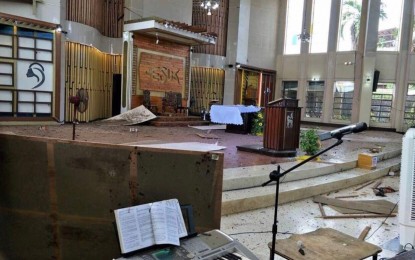
(File photo)
MANILA – The threat of terrorism taking a toll on lives and causing widespread damage to society is real and the government must do something to prevent it, a magistrate of the Supreme Court (SC) said on Tuesday.
“Let me make an analogy. Before a speeding car crashes into a wall or killing several pedestrians, there is a law that regulates speeding. And therefore, even before the harm is done, it is important for certain kinds of acts government looks at prevention or suppression of particular acts before they happen. Is that not correct?” Associate Justice Marvic Leonen asked in interpellating lawyer Algamar Latiph, one of the counsels for the petitions, during the oral arguments on the Anti-Terrorism Act of 2020.
Leonen enumerated a number of terrorist attacks, mostly in Mindanao starting with the February 2004 bombing of the Superferry 14 en route to Cagayan de Oro City from Manila, where 116 people died after a bomb hidden in a television set exploded as the ship passed the waters of Mariveles town in Bataan.
“One hundred sixteen people mean 116 families, six children less than five years old,” Leonen pointed out, noting that groups with links to the Jemaah Islamiyah, a militant extremist group based in Southeast Asia, has been widely acknowledged as being responsible for the attack.
He also cited the Aug. 24, 2020 twin blasts in Jolo, Sulu which killed 14 persons and wounded 75 persons, and the Jan. 27, 2019 bombing of the Jolo Cathedral.
“Do you agree we should not wait until it happens? We should give our law enforcers the tools to be able to detect and monitor, not only to detect and prosecute but to disturb the actual incident,” he asked Latiph.
Leonen also underscored the need to “cut the means of communications” between a “committed terrorist” with co-conspirators to prevent the actual act from happening.
“There is a criminal element as part of it which is to prosecute and convict in order for it to become a deterrent for the future. But in terms of addressing terrorism, there is also a law enforcement part to try to suppress so that it will not happen,” he said.
He said as terrorism is a threat to international peace, the Philippines is mandated to enact an anti-terrorism law, otherwise "the United Nations (UN) Security Council may sanction any state party of the UN charter if they do not follow their bidding or requirements".
Aside from facing sanctions, he said the Philippines may turn into a "safe haven" for transnational terrorists in the absence of anti-terrorism law.
“Because they will not be able to go our neighboring countries like Malaysia which has very strict rules, or Singapore or even Indonesia for that matter, and they will actually use the hinterlands or other places of Mindanao," he said.
Citing the scheme of international high-value terrorists going to Mindanao to marry a Filipina to get local protection, Leonen said “the concept of us becoming a safe haven might actually be happening even as we speak.”
“If therefore, we do not comply with international law or what is called by the (UN) Security Council in terms of preventing, suppressing or attending to terrorism, we will become the pariah because we will be training the bombers that will go to Malaysia, Indonesia, Hong Kong or even the United States," he said.
Leonen said it is important for the country's laws not to be backward and rudimentary but must be "state of the art" to equip law enforcers in addressing terrorism.
Noting that terrorism is an international phenomenon, Leonen also cited that social media has also become a way for terrorists to lure people into joining their ranks.
"That (social media) is the way many of our disenchanted youth may be radicalized using that medium,” he said as he mentioned reports of Filipino militants recruited to take part in Middle East flashpoints such as Syria and Afghanistan.
He added that a good anti-terror law is not meant to discriminate based on faith but to protect the people.
Addressing the issues raised by leftist groups, Leonen said there are many shades of Marxism.
"Extremism is different from terrorism. Extremism is a belief, terrorism is the method. A belief in this system is not terrorism. So, we punish the method but not the ideology," he said. (PNA)
